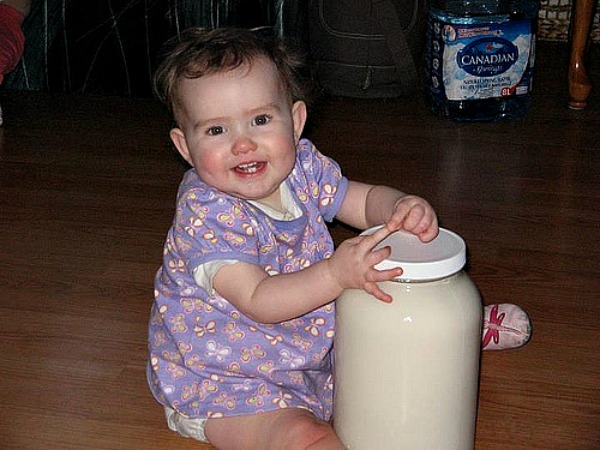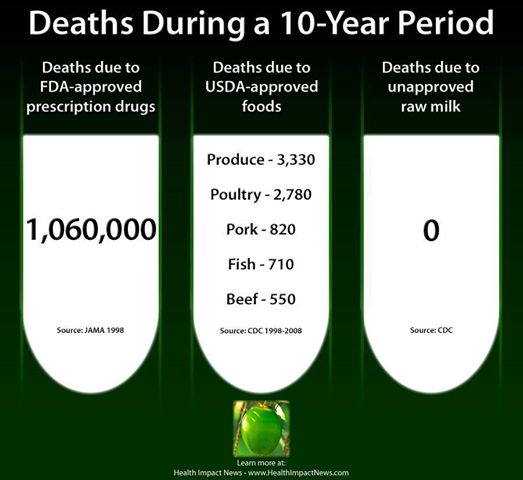 When I was first introduced to the benefits of raw milk nearly 20 years ago, I was newly pregnant with my second child. While I wanted to reap the benefits of this nutrient dense food, I was initially cautious to begin consuming it for fear it might harm my baby.
When I was first introduced to the benefits of raw milk nearly 20 years ago, I was newly pregnant with my second child. While I wanted to reap the benefits of this nutrient dense food, I was initially cautious to begin consuming it for fear it might harm my baby.
Everywhere I turned for research and information about the safety of raw milk during pregnancy was negative.
Numerous citations and sources I reviewed warned against consuming raw milk during pregnancy due to the risk of infection with Listeria monocytogenes, a deadly pathogen that can cause fetal death or premature birth.
While the research I uncovered contained dire warnings about infection with Listeria during pregnancy, I couldn’t actually find documentation about anyone who had actually contracted it from drinking raw milk let alone died or miscarried from it!
After much reading and thought, I concluded that the warnings against raw milk were unwarranted and the nutritional benefits to myself and my child vastly outweighed any risk.
I began to consume raw milk along with aged raw cheese, raw cream and raw butter late in the first trimester of my second pregnancy. I continued this practice throughout my second and third pregnancy with no ill effects. Both children were born healthy, full term and a normal weight.
Why Does the FDA Warn Against Raw Milk During Pregnancy?
In the 12 years since I began consuming raw milk while newly pregnant, the nonexistence of infection with Listeria monocytogenes for raw milk drinkers has continued. Analysis of Centers for Disease Control data on raw milk outbreaks listed no cases whatsoever of food-borne illness from raw milk caused by Listeria during the entire 13 year period from 1993-2005.
 On the other hand, there have been hundreds of illnesses from Listeria contracted from eating deli meats according to a 2003 USDA/FDA report.
On the other hand, there have been hundreds of illnesses from Listeria contracted from eating deli meats according to a 2003 USDA/FDA report.
In addition, 147 people across 28 states contracted listeriosis in 2011 from cantaloupes. 33 people died as a result of this outbreak and 1 pregnant woman miscarried.
Even pasteurized milk and cheese carries the very real risk of listeriosis. From 1998-2012, there were 50 illnesses and 10 deaths (1 fetus) from Listeria contracted from consuming pasteurized milk and cheese in the United States.
Are formal warnings issued to pregnant women regarding the dangers of eating deli meats, pasteurized milk and cheese or cantaloupes while pregnant?
No.
The FDA clearly has a double standard when it warns against consumption of raw milk during pregnancy when no cases or deaths of listeriosis are recorded and yet many have occurred for other foods.
The Dairy That Should be Avoided During Pregnancy
A very real risk of Listeria during pregnancy comes from soft, unaged cheese – both raw and pasteurized.
In Europe, there were 4 deaths from pasteurized soft cheese in 2009. There have also been a number of illnesses and miscarriages from Mexican style cheese made from raw milk including a few in my home state of Florida. This cheese is sometimes referred to as “bathtub cheese”.
If you are pregnant, it is wise to avoid soft, unaged cheeses of all kinds due to the very real risk of Listeria. However, grassfed, raw milk is safe as are aged raw cheeses, raw cream, and raw butter.
Sarah, The Healthy Home Economist
Sources:
Those Pathogens, What You Should Know
Multistate Outbreak of Listeriosis Linked to Whole Cantaloupes
The Nourishing Traditions Book of Baby and Child Care
Zero Deaths from Raw Milk, Health Impact News








Great article! I’ve gone back & forth over the years because of things I’ve read or heard. I drank it for a while years ago & then read something which made me stop drinking it. Recently, I’ve wanted to start drinking it again, but then I heard something from David Wolfe where he said it had to be clabbered or fermented to be safe. He said that the Amish drink it raw, but that the children all have warts on their hands because of viruses & bacteria in the milk. Sometimes I wish I didn’t read to or listen to others so much.
My children have been on raw milk for years and nary a one has warts!
The other thing to watch is what do the cows eat. For listeriosis specifically, the farmer should either avoid feeding silage or be extremely careful in managing the production of the silage.
Know your farmer 😉 We used to all know exactly where our milk came from. We are removed from our food sources today.
Marilyn, do you know specifically what to be careful of when managing silage? Growing up we fed silage to our cows on a regular basis. It was salted as it was put in the silo. I assumed it fermented just like cabbage does for sauerkraut. We drank the milk raw but never had any issues. I know grain feeding is not good for cows but the silage is mostly stalk and leaves and the percentage of actual corn kernels are small so I don’t really consider it grain feeding. Now that I’m off on my own our family is planning on getting a milk cow and am deciding what to feed for the best quality of milk. Any thoughts would be appreciated.
SoCalGT – apologies, I missed this… The challenge with silage is making sure it has healthy fermenting, which is all anaerobic, and never unhealthy – aerobic. No oxygen allowed. Haylage challenges: the wrapping – how can it be vacuum sealed? If we ignore that, then please be sure the wrapping is never punctured – be careful transporting it, protect it from hungry pests like rats as they will eat a hole in the wrapping. A quick google found this article:
http://www.countrywidefarmers.co.uk/pws/Content.ice?page=GuidesHowToGoodQualitySilage&pgForward=businesscontentfull
(hmmm. all one line, no spaces.)
It doesn’t mention listeriosis; this short article does discuss it well:
http://www.dow.com/silage/tools/experts/bact.htm
As attractive as haylage / silage are for feed, I’m too much of a nervous nellie to consider ever feeding it to my dairy flock or herd. Maybe to my beeves, but if the risk of messing up is high, I’m not so interested in making them sick either, eh? It’s intriguing – fermented foods are very healthy – but at least at this point I’m not comfortable with haylage and I don’t have space for silage, so I’m looking at other methods of supplementing in the winter.
Thank you for sharing Marilyn. So much to think about!
This is my first pregnancy drinking raw milk and had to remind myself of the lies told to me throughout the past 5 pregnancies about raw milk. I’m drinking it without reservations this time.
Could you provide a list of what counts as a soft non-aged cheese? Are you talking about cream cheese and cottage cheese? Blue cheese? Feta cheese? I’m not a cheesemaker so I’m not sure what’s aged and what’s not.
Actually having a glass as I read this!
wish we could afford it!
Wow, what a shock. Raw milk was consumed for centuries with not so good refrigeration…and now the CDC says it’s OK???
I’m 30 wks and have been drinking it every day throughout my pregnancy. I told my midwife and she just asked if I’d read up on the risks and found a good source, which I assured her I had–I’ve been out to the dairy farm I get it from myself!
I’m 30 wks and have been drinking it every day throughout my pregnancy. I told my midwife and she just asked if I’d read up on the risks and found a good source, which I assured her I had–I’ve been out to the dairy farm I get it from myself!
can’t find it in here in germany, but I’ll be guzzling it when I go back to the states to visit! 😀
where do you live? I live in southern Germany and buy fresh raw milk from our local farm… i find getting healthy raw food very easy here in Germany – much easier than in America it would seem!